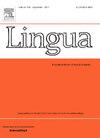Cultural conceptualisations of karma in American, Indian, and Hong Kong varieties of English
IF 1.3
3区 文学
0 LANGUAGE & LINGUISTICS
引用次数: 0
Abstract
Karma is commonly understood as the belief that morally relevant actions lead to proportionate consequences. By adopting a corpus-based approach, this study examines cultural conceptualisations of karma in American, Indian, and Hong Kong varieties of English from the perspective of Cultural Linguistics. It has been found that cultural schemas of karma mainly involve four themes: creation, operation, effect, and transformation/removal. In American English, karma typically arises from bad secular actions, results in negative secular outcomes, and is transformed or removed through secular practices. In contrast, in Indian and Hong Kong Englishes, karma often links spiritual actions to commensurate outcomes, operates through reincarnation, and is addressed through dharmic practices. Cultural metaphors of karma conceptualise it in both non-agentive and agentive terms. While non-agentive metaphors conceptualise karma in terms of causation, accounting, journey, and contagion, demonstrating cross-varietal similarities and differences, the agentive metaphor – karma is a supernatural agent – is almost exclusively found in American English. A diagram has been proposed to illustrate the interrelationships among the cultural schemas and metaphors of karma, highlighting its multifaceted, procedural, and dynamic nature. This study demonstrates the viability of a cultural-linguistic approach to studying English varieties by focusing on a specific cultural concept.
美国、印度和香港英语中因果报应的文化概念
因果报应通常被理解为相信与道德相关的行为会导致相应的后果。本文采用语料库为基础,从文化语言学的角度考察了美国、印度和香港英语变体中因果报应的文化概念。研究发现,业力的文化图式主要包括四个主题:创造、运作、效果和转化/消除。在美式英语中,业力通常源于世俗的不良行为,导致消极的世俗结果,并通过世俗的实践来转化或消除。相反,在印度和香港英语中,业力通常将精神行为与相应的结果联系起来,通过转世运作,并通过佛法实践来解决。业力的文化隐喻在非代理和代理术语中概念化它。非代理隐喻从因果关系、会计、旅程和传染等方面对因果报应进行了概念化,展示了跨品种的相似性和差异性,而代理隐喻——因果报应是一种超自然的动因——几乎只存在于美式英语中。本文提出了一个图表来说明因果报应的文化图式和隐喻之间的相互关系,突出了因果报应的多面性、程序性和动态性。本研究通过关注特定的文化概念,证明了文化语言学方法研究英语变体的可行性。
本文章由计算机程序翻译,如有差异,请以英文原文为准。
求助全文
约1分钟内获得全文
求助全文
来源期刊

Lingua
Multiple-
CiteScore
2.50
自引率
9.10%
发文量
93
审稿时长
24 weeks
期刊介绍:
Lingua publishes papers of any length, if justified, as well as review articles surveying developments in the various fields of linguistics, and occasional discussions. A considerable number of pages in each issue are devoted to critical book reviews. Lingua also publishes Lingua Franca articles consisting of provocative exchanges expressing strong opinions on central topics in linguistics; The Decade In articles which are educational articles offering the nonspecialist linguist an overview of a given area of study; and Taking up the Gauntlet special issues composed of a set number of papers examining one set of data and exploring whose theory offers the most insight with a minimal set of assumptions and a maximum of arguments.
 求助内容:
求助内容: 应助结果提醒方式:
应助结果提醒方式:


